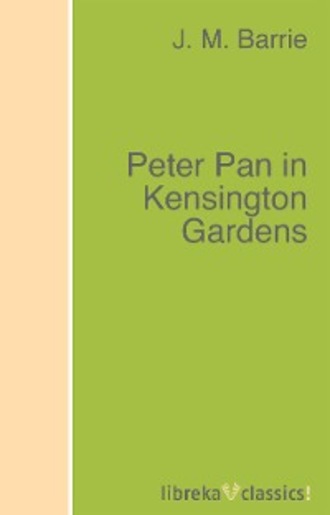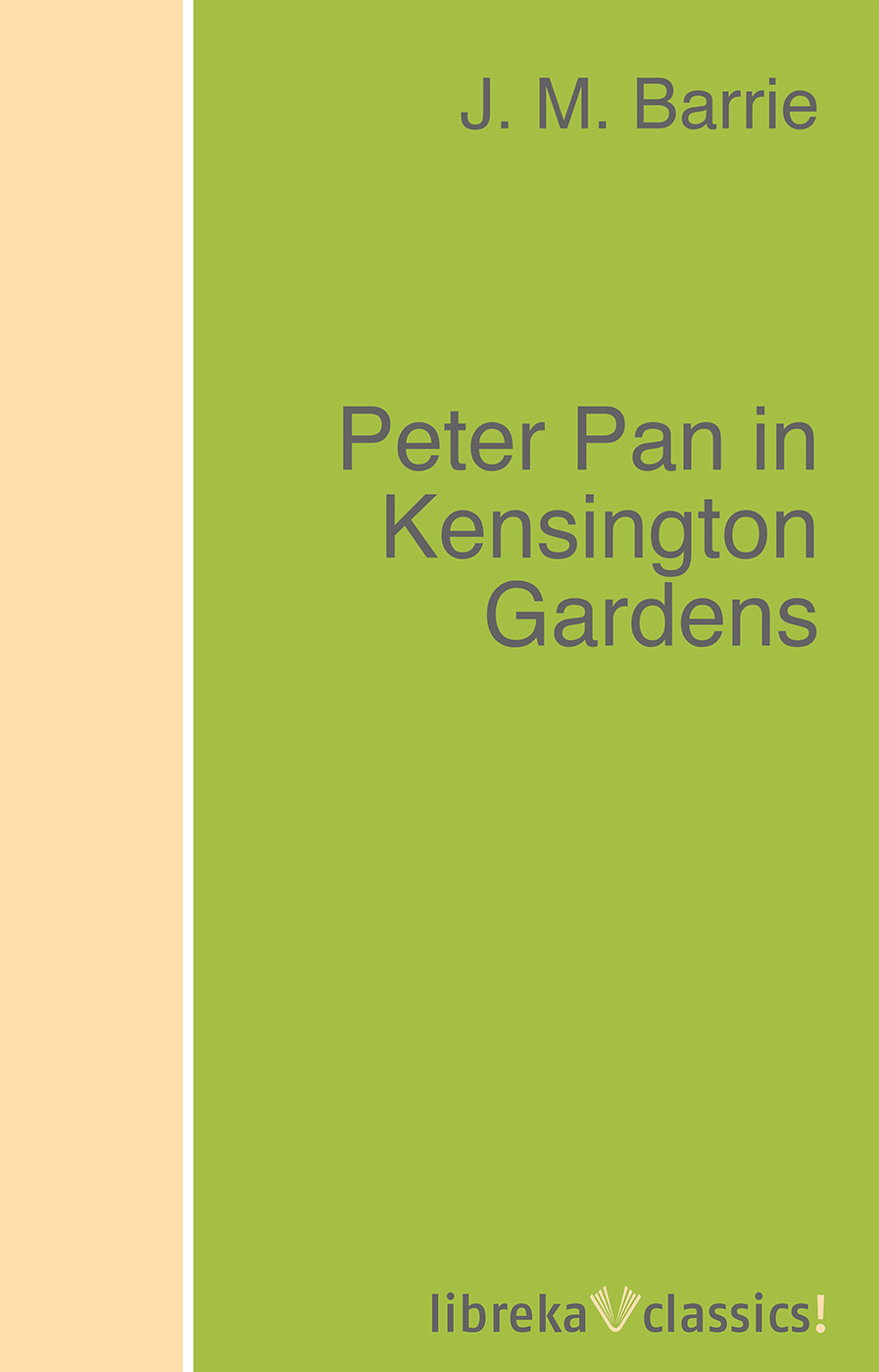
Полная версия
Peter Pan in Kensington Gardens


Titel: Peter Pan in Kensington Gardens
von William Shakespeare, H. G. Wells, Henry Van Dyke, Thomas Carlyle, Oscar Wilde, Joseph Conrad, Henry James, Anthony Hope, Henry Fielding, Giraldus Cambrensis, Daniel Defoe, Grammaticus Saxo, Edgar Rice Burroughs, Hugh Lofting, Agatha Christie, Sinclair Lewis, Eugène Brieux, Upton Sinclair, Booth Tarkington, Sax Rohmer, Jack London, Anna Katharine Green, Sara Jeannette Duncan, Xenophon, Alexandre Dumas père, John William Draper, Alice Christiana Thompson Meynell, Bram Stoker, Honoré de Balzac, William Congreve, Louis de Rougemont, Nikolai Vasilievich Gogol, Rolf Boldrewood, François Rabelais, Lysander Spooner, B. M. Bower, Henry Rider Haggard, William Hickling Prescott, Lafcadio Hearn, Robert Herrick, Jane Austen, Mark Twain, Mary Roberts Rinehart, Charles Babbage, Kate Douglas Smith Wiggin, Frank L. Packard, George Meredith, John Merle Coulter, Irvin S. Cobb, Edwin Mims, John Tyndall, Various, Charles Darwin, Sidney Lanier, Henry Lawson, Niccolò Machiavelli, George W. Crile, Théophile Gautier, Noah Brooks, James Thomson, Zane Grey, J. M. Synge, Virginia Woolf, Conrad Aiken, Edna St. Vincent Millay, Helen Cody Wetmore, Ayn Rand, Sir Thomas Malory, Gustave Flaubert, Edmond Rostand, Charlotte Brontë, Edith Wharton, Giles Lytton Strachey, Myrtle Reed, Ernest Bramah, Jules Verne, H. L. Mencken, H. Stanley Redgrove, Victor Lefebure, Edna Lyall, John Masefield, Charles Kingsley, Robert Burns, Edgar Lee Masters, Victor [pseud.] Appleton, Ellis Parker Butler, Mary Lamb, Charles Lamb, Johann Wolfgang von Goethe, Kenneth Grahame, Charles Dickens, John Ruskin, John Galt, James J. Davis, Owen Wister, William Blades, Sir Hall Caine, Sir Max Beerbohm, Baron Edward John Moreton Drax Plunkett Dunsany, Bret Harte, E. Phillips Oppenheim, Thomas Henry Huxley, A. B. Paterson, John N. Reynolds, Walter Dill Scott, Hans Gustav Adolf Gross, T. S. Eliot, Walt Whitman, Arthur Ransome, Jane Addams, Elizabeth, David Lindsay, Helen Bannerman, Charles A. Oliver, J. M. Barrie
ISBN 978-3-7429-1276-3
Alle Rechte vorbehalten.
Es ist ohne vorherige schriftliche Erlaubnis nicht gestattet, dieses Werk im Ganzen oder in Teilen zu vervielfältigen oder zu veröffentlichen.
PETER PAN IN KENSINGTON GARDENS
By J. M. Barrie
Contents
Peter Pan The Thrush's Nest The Little House Lock-out TimePeter Pan
If you ask your mother whether she knew about Peter Pan when she was a little girl she will say, "Why, of course, I did, child," and if you ask her whether he rode on a goat in those days she will say, "What a foolish question to ask, certainly he did." Then if you ask your grandmother whether she knew about Peter Pan when she was a girl, she also says, "Why, of course, I did, child," but if you ask her whether he rode on a goat in those days, she says she never heard of his having a goat. Perhaps she has forgotten, just as she sometimes forgets your name and calls you Mildred, which is your mother's name. Still, she could hardly forget such an important thing as the goat. Therefore there was no goat when your grandmother was a little girl. This shows that, in telling the story of Peter Pan, to begin with the goat (as most people do) is as silly as to put on your jacket before your vest.
Of course, it also shows that Peter is ever so old, but he is really always the same age, so that does not matter in the least. His age is one week, and though he was born so long ago he has never had a birthday, nor is there the slightest chance of his ever having one. The reason is that he escaped from being a human when he was seven days' old; he escaped by the window and flew back to the Kensington Gardens.
If you think he was the only baby who ever wanted to escape, it shows how completely you have forgotten your own young days. When David heard this story first he was quite certain that he had never tried to escape, but I told him to think back hard, pressing his hands to his temples, and when he had done this hard, and even harder, he distinctly remembered a youthful desire to return to the tree-tops, and with that memory came others, as that he had lain in bed planning to escape as soon as his mother was asleep, and how she had once caught him half-way up the chimney. All children could have such recollections if they would press their hands hard to their temples, for, having been birds before they were human, they are naturally a little wild during the first few weeks, and very itchy at the shoulders, where their wings used to be. So David tells me.
I ought to mention here that the following is our way with a story: First, I tell it to him, and then he tells it to me, the understanding being that it is quite a different story; and then I retell it with his additions, and so we go on until no one could say whether it is more his story or mine. In this story of Peter Pan, for instance, the bald narrative and most of the moral reflections are mine, though not all, for this boy can be a stern moralist, but the interesting bits about the ways and customs of babies in the bird-stage are mostly reminiscences of David's, recalled by pressing his hands to his temples and thinking hard.
Well, Peter Pan got out by the window, which had no bars. Standing on the ledge he could see trees far away, which were doubtless the Kensington Gardens, and the moment he saw them he entirely forgot that he was now a little boy in a nightgown, and away he flew, right over the houses to the Gardens. It is wonderful that he could fly without wings, but the place itched tremendously, and, perhaps we could all fly if we were as dead-confident-sure of our capacity to do it as was bold Peter Pan that evening.

